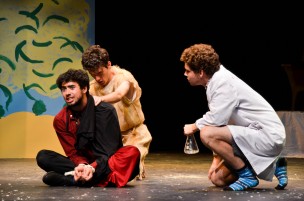Prophesies, sexual awakenings, and worms, oh my!
The end is nigh. Humanity has been overrun by a collective intelligence more ancient and powerful than its own. In its last days, humankind was presented with a prophetic vision, according to which the eldest daughter of the last free human family would rise up and free humanity at last. Oh, and the terrifying oppressors? They’re worms.
“The Worm Queen,” written by Will McGhee ’17, is the first play produced by Second Stage this season, and it starts the theater company out on quite the weird foot—or lack thereof.
“I don’t know where the worms came from,” McGhee said. “I kind of came up with the idea based on this one event at the end of Act I, and, like, I knew some kind of hero’s journey was going to be involved, and I do not know how the concept of evil worms got involved with that, but somehow it did and it stuck because I found it too thematically relevant. So it kind of skyrocketed from there.”
“The Worm Queen” opens on our prophesied queen and savior, Mary (Emma Hagemann ’17), on the last piece of land untouched by worms. She shares this tiny island with her overprotective and hilariously deadpan mother (Zoe Thrasher ’16); her nihilistic brother, Charlie (Jordan Tragash ’18); her sister, Lizzie, who can communicate with cuttlefish (Mio Magee ’18); and Dr. Blakemore, who really shouldn’t be allowed to hold any kind of degree (Russell Goldman ’17).
This dysfunctional family lives in a strange sort of peace. For 30 years, the island has remained untouched by worms, which, despite being able to conquer most of the world, have some trouble crossing water. The family has had no contact with the outside world, no chocolate, and apparently no adequate forms of birth control. All of that (except for the chocolate) changes with the appearance of two strange visitors. After all, it’s not a real apocalypse unless the chocolate is all gone.
Insert Root (Adam DeSantes ’18), one of the few surviving humans allowed to serve the worm collective, and his master Vessel (Max Cembalest ’18), a human chosen to be the voice of the worm collective, a job which comes with a very fancy cape. Villain and stooge attempt to infiltrate this last bastion of humanity with debatable success.
Wesleyan has become a haven for student playwrights, having just completed a season of almost entirely student-written work. McGhee commented on his own process as a newcomer to both playwriting and directing.
“It’s a very new experience,” McGhee said. “Like, this is the first time I’ve written a major project and then gone through a severe editing process, and then this is the first time I’ve directed anything, so it’s a lot of new things. It’s been really cool. A quick process; I started in late February. I finished the first draft around I think late April, and then I had been editing it off and on during the summer. And then we got here! It’s been really fun and really weird to see the other people, like, memorizing your lines and like running them on their own spare time just around campus.”
McGhee’s stage debut is a strange, amusing, and at times disgusting commentary on the essence of human nature. When pushed to the edge, how do we break? Hagemann’s Mary represents the idealist crippled by the immensity of the task before her. Tragash’s Charlie is the classic middle sibling, who will do or say just about anything for attention, but doesn’t know what to do when he gets it. Thrasher plays Mary’s mother as the survivor, already broken by war, unable to do much but cling to life with everything she has. Goldman’s Dr. Blakemore is a scientist whose supposed degree only loosely masks his untenable sanity. DeSantes’ Root is the cockeyed optimist, finding love in the darkest place on earth, and determined to discover the secrets to the lost art of making out.
The star performance of the evening is by Cembalest, a newcomer to the Wesleyan theater scene whose booming voice and over-the-top theatrics immediately called back the cartoon villains of my youth. At times the sole source of joy in this dark comedy, Cembalest serves as a reminder that pure evil can be as stupid, petty, and bumbling as the rest of us.
Tickets for Friday and Saturday performances of “The Worm Queen” are available at the box office for free (the worm collective has moved beyond the human notion of capitalism). After you get your ticket, you can slither on down to the ’92 and see for yourself the rise of “The Worm Queen.”
